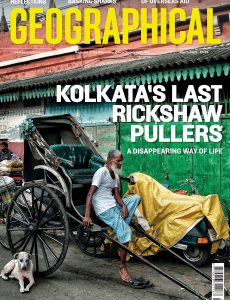
Geographical – March 2022
English | 86 pages | pdf | 81.08 MB
Change comes to us all, and never more so than today, with technology dramatically and speedily altering lives. It can be a good thing – providing people with more time a.nd leisure, and with safer, less physically demanding jobs. On first glance this is certainly what you might think about the rickshaws of Ko]kata. Pulled by hand through busy alleys, these structures remain unchanged since
they were introduced by the British Raj and they involve back-breaking labour for the men who pull them. The city’s plan – to replace them with cycle-rickshaws, some powered by electricity- feels, if anything, overdue. And yet, change must
be managed extremely carefully. As journalist Laura Fornell and photographer Oscar Espinosa discovered when they spent time with Kolkata’s rickshaw pullers
(page 36), not everyone will be carried forward when the plan finally takes place. Modernisation must be managed delicately.
On a much wider scale, there’s a similar message in this month’s dossier on overseas aid (page 20). Giving money and resources to poorer countries is clearly a good thing, and yet the manner of giving is hugely important if it’s to have the desired effect. Today, the landscape of aid-giving is changing as new challenges bite. But the risk remains that rich countries, sure they know best, dictate a path not at all appropriate for the receiving nation.
Elsewhere in this issue, we turn our attention to the wonders of the natural world. On page 28, Nie Davies goes in search of the enigmatic (and hard to locate) basking shark, on page 46 Norman Miller considers our planet’s newest natural islands
(although read on for some extremely un-natural ones), and on page 54 Olivia Acland meets the primates of the Lwiro Rehabilitation Center.
Kati,e Burton
Editor
Download from: